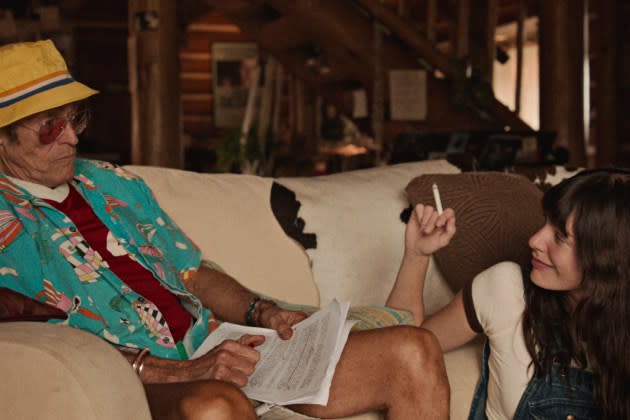Patricia Arquette on the Actors Strike and Directing the Hunter S. Thompson-Inspired ‘Gonzo Girl’: ‘We Have to Fight For Our Art Form’

When Patricia Arquette decided to make her feature film directing debut with “Gonzo Girl,” she made a promise to her cast.
“I told them that I would always edit everything for the acting — even if the camera work wasn’t the best in that take or some thing didn’t match from a continuity perspective,” she says a week before the movie’s big premiere at the Toronto Film Festival. “I don’t think someone has ever edited my performance directly for the acting, so I wanted to do this greedy, delicious thing for my ensemble. I wanted to create a space for great acting.”
More from Variety
Filmmaker Minhal Baig Digs Into Childhood Hopes and Trauma in Toronto Premiere 'We Grown Now'
Fawzia Mirza Visits the Past to Know the Present in 'The Queen of My Dreams' Playing at Toronto
It helps, of course, that the star of “Gonzo Girl” is none other than Willem Dafoe, a four-time Oscar nominee, as well as rising talents such as Camila Morrone of “Daisy Jones & the Six.” And that kind of creative freedom, and not big salaries, was presumably what attracted them to this low-budget, very indie adaptation of Cheryl Della Pietra’s semi-autobiographical novel about her roller-coaster tenure as Hunter S. Thompson’s assistant.
“It was a high-speed chase the whole time,” says Arquette. “We had three weeks to shoot the whole thing. The creative process was terrifying. We had no money. I hadn’t done this before. It was like learning on the job.”
And though the hallucinogenic-enhanced, gun-toting, sunglasses-wearing, always-intoxicated writer that Dafoe plays has more than a passing resemblance to Thompson, he’s been rechristened Walter Reade for the purposes of “Gonzo Girl.” Arquette and Dafoe were also careful to provide some distinctive shadings (the actor doesn’t imitate Thompson’s distinctive patter, for instance).
“Neither Willem nor I were interested in doing some caricature of Hunter S. Thompson,” Arquette says. “It felt derivative and it felt like it would limit the movie. This is its own thing and its own creation even though it’s definitely inspired by him. We’ve seen a caricature of him in several movies and that wasn’t something either one of us wanted to explore.”
But Arquette was interested in exploring what happens when a creative mind gets stuck — when they can’t figure out fresh avenues to pursue with their talent or when they feel like they are being asked to reprise their greatest hits. That’s something that seemed to happen to Thompson in his later years, when his output diminished and he appeared to be coasting on the gonzo reputation he established with “Fear and Loathing in Las Vegas” and “Fear and Loathing on the Campaign Trail.” Arquette, who has been in the public eye since the 1980s, understands that kind of burden.
“I see it even with myself,” she says. “There are so many people who love ‘True Romance.’ That was a very pivotal movie in their world. Had I not gone on to do all these other different things, people would just be talking to me about that.”
Arquette, as she suggests, was able to keep maturing as an artist, winning an Oscar for “Boyhood” and starring in the buzzy streaming hit “Severance.” Others aren’t as lucky.
“I’ve seen this all the time with celebrities where people kind of hone in on one moment in their life,” Arquette adds. “For other artists or musicians, people just want you to replicate that one hit you made. You kind of have your tongue cut out. It prevents you from going where you need to go creatively and yet that’s where you get your love and your money. That’s where you get your ego boost. Your celebrity can become a cage.”
Arquette is excited to attend Toronto with “Gonzo Girl.” But the festival will be a lot less star-studded this year. That’s because actors and writers are on strike, holding out for a contract that gives them a greater share of streaming royalties, as well as protections against emerging technologies like artificial intelligence. Arquette is allowed to promote her film because it was produced outside the studio system and has received a promotional waiver from the Screen Actors Guild, but her heart is on the picket line.
“It’s a very important strike, maybe the most important strike of my life,” she says. “Movies like ‘Gonzo Girl’ will not be made by AI. They will be made by and for and about human beings. This strike is about the actors and the movie industry today, but it’s everyone else tomorrow. We really need to look at the world we want to make as human beings. We have to fight for our art form.”
Sign up for Variety’s Newsletter. For the latest news, follow us on Facebook, Twitter, and Instagram.

